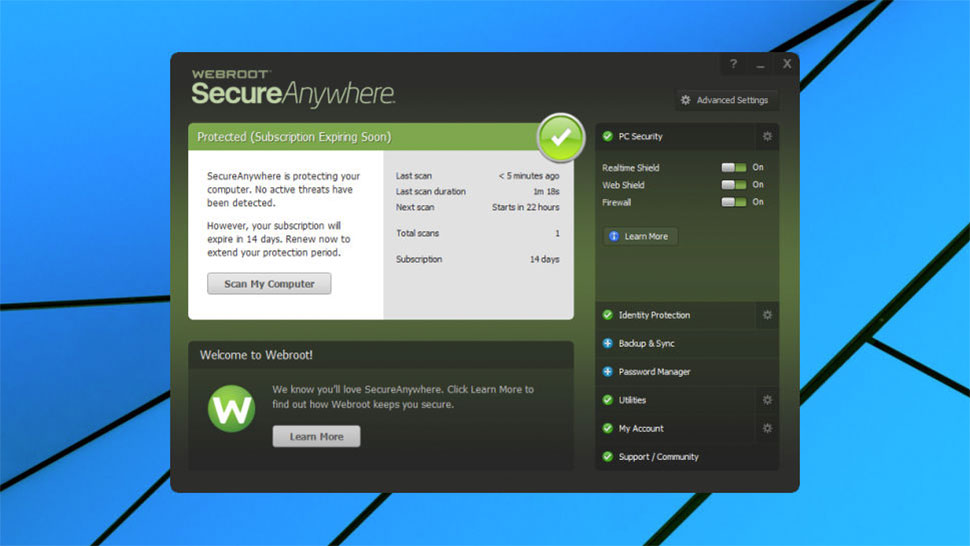Our Verdict
This antivirus app has plenty of top features while being tiny – but its reliability is a matter of some debate.
For
- Really fast
- Seriously lightweight
- Precise URL blocking
- Boatloads of features
Against
- Mixed results in independent tests
- Limited configuration options
- Advanced features can be confusing
Why you can trust Creative Bloq
For anyone after the best antivirus software, Webroot SecureAnywhere AntiVirus is worth a look. It has plenty of great features including real-time threat protection, anti-ransomware, URL filtering, continuous anti-phishing monitoring and even a basic firewall, and it's exceptionally lightweight, with our test system indicating just a solitary 3.77MB executable (an INI file), and that's it.
The benefit of such a lightweight footprint is that Webroot is not grabby at all on system resources, and runs really fast- like a Ferrari on a test track fast. Webroot suggests that this program runs up to 60 times faster than its competitors.
Webroot's price is quite average at $29.99 (£22) for a one-year, one-device licence. This increases to $39.99 (£30) for the renewal. That makes it somewhat less costly than Bitdefender ($39/£30 with no introductory discount), but still costing more than Kaspersky Anti-Virus ($29.25/£22.50 year one, $32.50/£25 on renewal) and Trend Micro Antivirus+ Security ($26/£20).
Webroot SecureAnywhere: setup
Installation is a swift process, which makes sense considering how small the Webroot package is. Unlike competitor antivirus programs, Webroot is quite fine if you have another antivirus program installed, as on our system Trend Micro Antivirus+ Security was already installed, and Webroot had no issues.
After the initial setup, Webroot launches into an initial system scan. The scan took under a minute on our test PC and found a few adware-related items that our other antivirus products didn't locate. The user then gets the opportunity to review these results, and can deal with any issues with a few clicks. Afterwards, Webroot returns to the main task of PC protection.
Even with older PC systems, Webroot has minimal impact on system performance. Webroot merely adds two additional background processes on our test system, with the first a user application, and the second a service. Combined they only consume just under 10MB of RAM, which is pretty minimal on a modern PC.
Webroot SecureAnywhere: features
Webroot SecureAnywhere AntiVirus has a complicated interface at first glance, with many panels, buttons, switches and icons. However for the most part Webroot is quite straightforward to use.
You can launch a simple scan with the extra-large Scan My Computer button, or via a right-click on the Webroot system tray icon. There are options among the scan types, that include a quick scan of the RAM only, a full scan of the local hard drives, a deep scan that searches for rootkits, Trojans and more, and a custom option to target a scan on specific files or folders. Webroot buries these options so deeply in its interface that you might not figure out these options are here, as you have to head to PC Security > Settings > Custom Scan to find them.
Our scan times exceeded the claimed 20 seconds on their website, with even the fastest option measuring a significantly longer 50 seconds when we tested it. We were hardly disappointed though, and appreciated that even a deep scan was quite fast and completed in only 50-75 seconds. This was quite thorough with a high detection rate; the program located all the sample threats on the test, although we did experience a few false alarms that got set off from legitimate downloads.
With a simple right-click from Explorer you can scan any file, folder or drive. This engages the equivalent of a complete scan in competing antivirus packages, which then searches through every last file on the system. This is a far slower option than other optimized Webroot scans, and useful for situations that a complete scan is needed to fully sanitize a system.
URL filtering is another useful feature. Webroot's expansive database of malicious websites, which grows by about 25,000 addresses every day, keeps your system free from any issues. To test this is a bit of a challenge, but in use it does a solid job, with regular blocking of malicious sites that both competing solutions such as of Google Chrome and Windows SmartScreen both missed.
Webroot includes a basic firewall, but unfortunately it lacks in-depth settings for protocols and ports. Instead, SecureAnywhere AntiVirus takes on the heavy work, and searches out new and untrusted processes that are attempting a connection to the internet. Users are warned about these potential data transfers via untrusted applications, and then you can approve or deny them prior to any movement of the data. Most power users will still be left wanting for more control, but other than that, we like is feature and welcome it to an antivirus suite.
Additionally, a background Identity Shield protects browser sessions. Data is shielded from multiple potential attack points such as keyloggers, screen grabbers, clipboard snooping and other nasty attempts that attack your data.
Not willing to accept these features at face value, we installed a basic freeware keylogger, and headed to the internet with the Chrome browser. With the Identity Shield set to off, the keylogger made a record of URLs, usernames, passwords and literally everything that we typed. With Identity Shield turned on, recording of all the alphanumeric and symbol keys was completely blocked, which gave the keylogger file totally worthless data with only references to the spacebar, Enter and Ctrl.
Webroot hardly makes a big deal about it, but SecureAnywhere AntiVirus also has multiple additional tools, including a nifty sandbox for running questionable programs in a safe environment. In addition, the Antimalware Tools dialog can be used to manually remove suspect programs, along with associated registry entries.
We also like the system repair features, including the option to 'Set system policies to defaults'. It's useful in situations where malware or another program has disabled the Task Manager, Regedit, or imposed another policy-type restriction, as Webroot can make it right in a jiffy.
It's unfortunate that the SecureAnywhere interface does not do a good job of pointing out these tools, which could be better organised. Often the only way to understand what Webroot can do is by browsing through multiple areas, however if you're prepared to dig deep you'll eventually find the many unique and powerful tools that the program offers.
Webroot SecureAnywhere: protection
SecureAnywhere AntiVirus aces the basic testing when it comes to simple malware detection, but this only provides a limited view on how this program functions. For a more comprehensive look, we turn to the test rankings of the major independent testing labs.
However, the major testing labs, like AV-Comparatives and AV-Test, have not done testing on Webroot recently, or in fact for several years now. Their problem stems from their testing methodology, as they typically run a malware sample simultaneous to the antivirus program. A successful hit gets scored when the malware gets an immediate block, or gets failed if the malware runs. This methodology is excellent for many antivirus programs, but Webroot really doesn't work the same as other solutions.
Webroot in many cases lets the malware run, identifies the suspicious behaviour, and then neutralises it. You are quite protected, as SecureAnywhere will shut down any threats. Any potential damage is reversed, even to the point of restoring files encrypted by malware, but on this test it gets a failing score.
One exception is the SE Labs Home Anti-Malware Protection report, which is quite technical and beyond most novice users. Its report has a flexible scoring system which can better account for how Webroot works. Once again we are disappointed as these test results are low as well, with the July-September 2018 report putting Webroot right at the bottom of the 13 antivirus solutions tested. Even the poorly regarded Windows Defender had a better performance than Webroot.
Searching high and low, we did find some more favourable news from another, lesser known testing lab, MRG Effitas. Even it only occasionally includes Webroot in its tests. Its Q2 2018 MRG Effitas 360 Degree Assessment & Certification report is a relatively conventional real-world detection test of antivirus software, and its methodology considers both ways to neutralise a threat: behavior-blocked over time, and immediate detection and neutralisation.
Unfortunately, its report indicates that Webroot detected only a minority of the threats immediately, which is what we would expect from Webroot. However, it did pick up others threats via behavior blocking after a minor delay. Also, no threats were missed in the critical Full Spectrum or Ransomware testing.
For the most complete picture of Webroot SecureAnywhere's strengths, we next pitted it against a home brew, custom ransomware simulator. As this is an internal package, it cannot be spotted from any predefined database of signatures, which makes it a test of Webroot's behavior monitoring capability.
Once again unfortunately, the outcome disappointed. On this test, SecureAnywhere just completely ignored the simulated ransomware, which allowed encryption to proceed of thousands of files, via the corresponding gigabytes of data.
Quite frankly, we can't fully discount Webroot only on this one test, and we realize that our test ransomware threat isn't actual malware. We also are not sure why Webroot failed in identification of it. However, we will point out that other antivirus solutions did perform better on this test, as Trend Micro Antivirus+ Security could shut down our ransomware within mere seconds of launch, and decrypted three files the ransomware had locked up.
At best, this gives us a mixed picture of Webroot's performance. The MRG Effitas report did confirm our general experience, as SecureAnywhere's smart technology was reliable in detecting and blocking multiple threats, with minimal impact to system performance. However serious reliability questions are raised, by other tests, including those from the leading labs, which makes us hesitate to give a solid recommendation to this product.

Thank you for reading 5 articles this month* Join now for unlimited access
Enjoy your first month for just £1 / $1 / €1
*Read 5 free articles per month without a subscription

Join now for unlimited access
Try first month for just £1 / $1 / €1
out of 10
This antivirus app has plenty of top features while being tiny – but its reliability is a matter of some debate.

Sead Fadilpašić works as a staff journalist at Cryptonews.com, where he regularly writes news on and analyses blockchain and cryptocurrency. Based in Sarajevo, Sead previously worked as a freelance journalist, with Techradar Pro being one of the titles he contributed to during this time.

